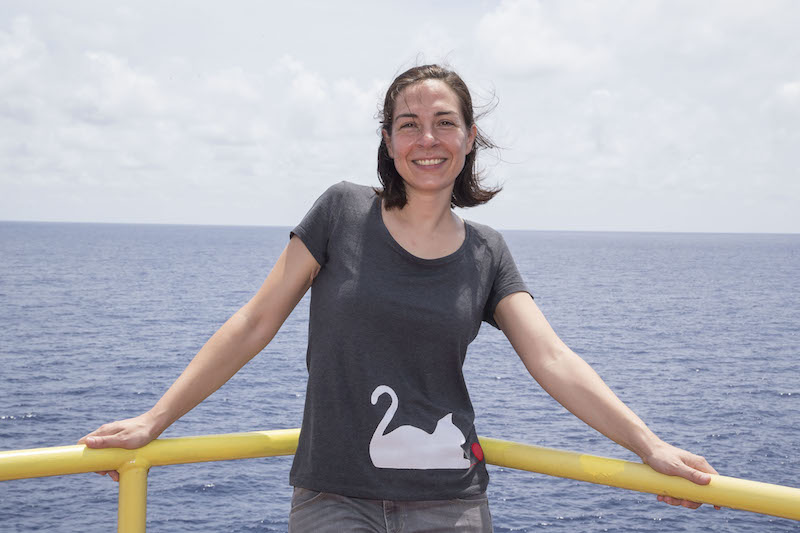
A Passion for Discovery – Interview with a Paleomagnetist!
It is hard not to get excited about the rocks of the earth when you sit down with Sara Satolli. I had the extreme pleasure of interviewing her last week. My mind is forever changed about whether or not rocks are interesting. I also learned a great deal about the reputation of the JOIDES Resolution in the Geology community. Sara is over the moon about being here and her enthusiasm is contagious!
What do you do on the ship?
I am a geologist and I get to study the history of the Earth. It’s never boring. I like this kind of life; I think I was born to do this. Immediately, I found this (IODP) program to be one of the most international program, so I sat dreaming about how to participate. The first time I heard about the JOIDES Resolution, I was still a student in Geology.
We are here to study the South China Sea; questions like: how did the ocean form? I’m here as a paleomagnetist, but I’m also a structural geologist so in this expedition I can find a perfect match of what I usually do. I was so excited to find out that I was accepted for this expedition. I am so happy to be here – that’s why I am always smiling!
Shifts are odd because we work 12 hours a day for 7 days a week. But, the work environment is perfect because there is a team of technicians that can help you every time you have a problem. I also like this well-planned day because I get up in the morning, I go to the gym, then I shower, then I eat and go to work. Of course it can be challenging – for example, speaking English. Everyone is from a different country but we speak English as the common language, but sometimes it can be hard to express yourself if you are not very strong with that language or it can be hard to understand the other person’s accent.
Also, it can be difficult to find a moment alone, if you want that, because the ship is very crowded. But, people are very caring here. I had one very bad day and every time I left from my computer station and came back, I kept finding chocolate at my computer. So, people are very caring.
What are the objectives of this expedition?
Oceans do not all form in the same way. That is maybe what we thought several years ago when the theory of plate tectonics was invented. But, then we found out that we can have different mechanisms. The South China Sea is actually very peculiar, so that’s why we are here.
We expected to find a particular kind of rock – a serpentinite – which should indicate a margin that opened to extension then continental crust without much magma. But actually, we found a lot of magma and lots of basalt and that’s not what we were expecting.
That’s the joy of discovery! Looking for something and finding something else. Finding something different than expected, for me, that is very exciting.
What is a Paleomagnetist?
I study the ancient Earth magnetic field that is recorded in the rocks we are sampling. Magnetic field of the Earth wasn’t always as it is now. Now we define it as having a “normal” polarity, but in the past it was ”reversed” then normal again, then reversed, then normal.
With special tools, we can detected this very weak signal to determine if the magnetic orientation rock is normal or reversed. Then, we can create a scale and compare this to the official scale and determine the age of the rock we are sampling.
What do you love about science?
I’m curious. And I think that curiosity is fundamental to be a scientist and a researcher. I like when I’ve been working on a problem for months, doing all of the field work and the lab work, and puzzling over the questions and finally I get the answer. Or, I find something completely unexpected.
The work environment always changes, I’m not always in an office from 9-5. My office can be the mountains, or in this case, the South China Sea.
What advice would you give a young person who is considering pursuing science?
He or she should be curious and should be fond of research. Also they should be stubborn. It requires several years of study. The tough part is after that, because it can be difficult to find a position. So if you do not really want to be in this field, then let it go. You have to be passionate about research. When you finally succeed, you get the best job in the world. So, it’s worth it!
What do you wish the public better understood about science and the process of discovery?
Scientists don’t always have an immediate response (answer). It can be abstract. But actually it’s fundamental because most of the things we have in our life, internet, medicine, etc, were discovered by accident or maybe while the researcher was pursing something else. It’s difficult to understand why, but it’s fundamental to keep going to keep researching.
Lately, a lot of attention is spent in outer space and that’s cool and necessary. But, we still know so little about what we have under our feet. And, being a geologist on this ship is a lot like being an astronaut. They study the universe, and we study this very special planet.